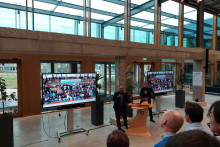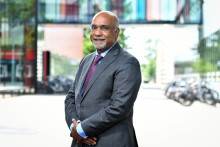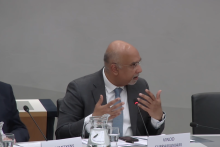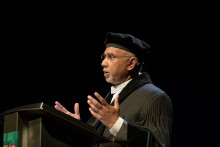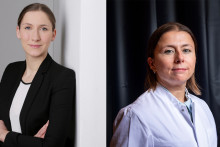A few dozen ITC members took a seat on the stairs in the central hall of Langezijds – and behind the balustrade above. The Faculty Board holds such a get-together every six weeks, but this one was specifically in the context of the internationalisation discussion and the upcoming legislation. Because, as Dean Freek van der Meer introduced: 'This topic touches on the cornerstone of who we are as an inclusive and welcoming faculty.'
'Kafkaesque situation'
‘It's a Kafkaesque situation,’ Subramaniam opened his argument. 'I never thought that we would end up in a situation where we, as a university, might have to exclude people.' The President of the Executive Board immediately issued a warning: his answer to many questions is: ‘I don’t know’. 'We know that the legislation is in the making and that a proposal went to the Education Council and the Raad van State. But as universities, we have not seen the text of the law yet, which says something about the process. I have no doubt that the legislation will have consequences for us. But we don't know what those consequences will look like. It's like we're shooting at a moving target.’
Randstad problem
Subramaniam then addressed students' questions, such as: is there a risk that master's programmes have to be offered in Dutch? And: is the influx of international students not more of a Randstad problem? He was cautious making statements about the language of instruction in master's programmes, but the focus of the legislation is primarily on the bachelor's programmes. Moreover, before legislation can be implemented, it will be years further and it is mainly a matter for decentralized participation like a programme committee, Subramaniam said.
And housing for international students is indeed a different problem in Amsterdam and Utrecht than in Enschede, Subramaniam continued. 'The problem with legislation is that it is a one-size-fits-all solution that ignores local accents. That is why we hope that there will be room in the exceptions that will be included in such a law. That's what we're working on and fighting for.'
Most realistic scenario?
One student present asked what the most realistic outcome is. Subramaniam, again with some hesitation: 'I don't know, but if you look at Rosanne Hertzberger's motion of the New Social Contract - which was adopted by the House of Representatives with a two-thirds majority – there will be more Dutch in the bachelor's programmes. I expect it to go in that direction. And I also foresee the possibility that the percentage of international students in the Netherlands will be limited to, for example, 25 percent.' Once again, Subramaniam expressed his hope for exceptions. 'They may be available for regional universities and for certain – technical – sectors. In both cases, that could be a positive thing for us.'
Languages
But it remained a matter of speculation on Thursday afternoon in the central hall of Langezijds. Even when the questions from employees were discussed, focused, among other things, on the political discourse in the Netherlands and on learning the Dutch language for international employees. One employee present suggested that technology could be the solution. 'Look at how fast the development is going. I can well imagine that a lecture – in whatever language it is given – can be subtitled live.'
The language certainly doesn't have to be a bottleneck, replied the president of the Executive Board, who advised those present to learn the Dutch language. 'For me, it helped me integrate. In fact, I wouldn't be here in this position if I hadn't learned the language.' One attendee suggested that language proficiency requirements should be laid down in employees' employment contracts. The President of the Executive Board was not unsympathetic to this. 'As an employer, we must at least be upfront and transparent about what can be expected, whatever our requirements would be.'
Homework
But the entire discussion around internationalisation is not so much one of pragmatism, as he bridged the gap to the political climate in the Netherlands in 2024. 'It's one of culture and wanting to guard it. Everyone here knows that knowledge knows no boundaries, but there are signals from society that certain limits have been reached. We can't close our eyes and ears to those signals; We are funded by the taxpayer and have obligations to this country and to the taxpayer.’
‘We can think all kinds of things about the recent election results, but it is what it is,’ Subramaniam said realistically. ‘As a university, we have our homework to do. We have been too ineffective in showing how we contribute to society and what our added value is for the city, the region and the country. We have a responsibility to contribute to a healthy debate on this topic.'
Soapbox
He himself is already shouting on the soapbox, Subramaniam said. 'And now companies like ASML are starting to get involved. Now that a big gorilla from Eindhoven comes forward, you suddenly see a political reaction and action. But where were the big companies more than a year ago, when this discussion was already going on? I'm an optimist by nature, but I hope it's not a case of too little, too late.’
For the time being, it remains a matter of waiting and asking more questions than answers, both for the president of the Executive Board, the ITC faculty and the rest of the UT. Steadfast, if it’s up to Subramaniam. With an unyielding message to the audience, 'Don't let the bastards grind you down', he closed the session.


